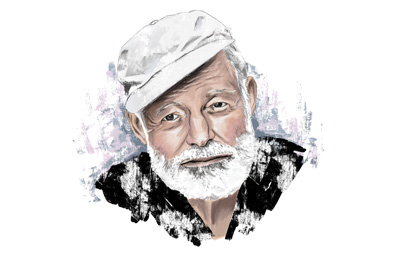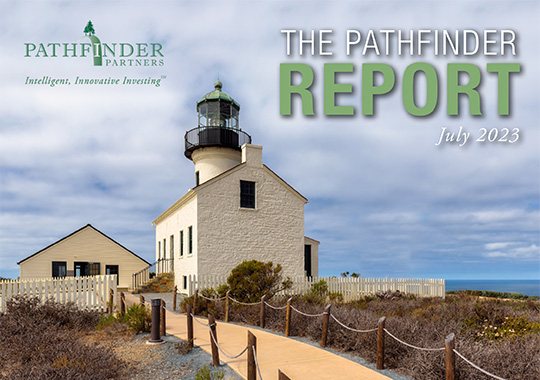Finding Your Path
A Summer’s List
By Lorne Polger, Senior Managing Director

Historically, the summer season has been a bit slower for Pathfinder. Most of our industry deal makers head to the hills or the oceans at various points in July and August to spend time with family and recharge the batteries. This is especially true this year as deal volumes across the commercial real estate spectrum have fallen off the proverbial cliff, waiting for the wide gap between bid and ask pricing to narrow and for the markets to settle back down. More on that in September’s newsletter…
I’ve been a voracious reader, although these days, it occurs most often in the first couple of hours of each morning as I digest a daily breakfast of various business and real estate periodicals with my coffee, as opposed to the evening reading ritual that I used to regularly partake in. But during this slower summer period, I thought I would compile a list of some books that have been most meaningful to me, both personally and professionally, over the years. I’ve gone back and reread some of them in the past and am planning to do so again this summer. Feel free to grab one off the shelf (okay, Amazon will have it to your house within an hour or two, or less if you’re a Kindle reader) and feel free to email me your recommended list. I’m happy to share it. Without further ado, here’s my top ten:
 The Sun Also Rises, Ernest Hemingway (1926). Inspired by Hemingway’s trips to Spain, a novel that portrays American and British expatriates who travel from Paris to a festival in Pamplona to watch the running of the bulls and bullfights. The Sun Also Rises is about being uncomfortable in things that should be easy: the action of bullfighting, trust in friendship, relief in a stiff drink, etc. The book focuses on the lives and interactions of people who are constantly seeking fulfillment and happiness in fleeting things. It was the first of Hemingway’s books that I read. Although not my favorite (that was The Old Man and the Sea), it turned me on to the richness of his words. I subsequently read all his works. Particularly timely today, especially with this passage: “How did you go bankrupt?" Bill asked. "Two ways," Mike said. “Gradually and then suddenly.” This, known as Hemingway’s Law of Motion, is startingly applicable to distressed projects.
The Sun Also Rises, Ernest Hemingway (1926). Inspired by Hemingway’s trips to Spain, a novel that portrays American and British expatriates who travel from Paris to a festival in Pamplona to watch the running of the bulls and bullfights. The Sun Also Rises is about being uncomfortable in things that should be easy: the action of bullfighting, trust in friendship, relief in a stiff drink, etc. The book focuses on the lives and interactions of people who are constantly seeking fulfillment and happiness in fleeting things. It was the first of Hemingway’s books that I read. Although not my favorite (that was The Old Man and the Sea), it turned me on to the richness of his words. I subsequently read all his works. Particularly timely today, especially with this passage: “How did you go bankrupt?" Bill asked. "Two ways," Mike said. “Gradually and then suddenly.” This, known as Hemingway’s Law of Motion, is startingly applicable to distressed projects.
The Grapes of Wrath, John Steinbeck (1939). My favorite author and arguably Steinbeck’s seminal work, the novel evokes the harshness of the Great Depression and arouses sympathy for the struggles of migrant farmworkers. The book is rooted in the historical and social events of 1930s America, focusing on the impoverished and dispossessed who come together to gain power against capital-minded owners. Humans finding strength in group unity and action is a message that still resonates with me today. I enjoyed many other works by Steinbeck, including Of Mice and Men and East of Eden, but Grapes remains my favorite.
1984, George Orwell (1949). Orwell wrote this book as a warning after years of observing the twin menaces of Nazism and Stalinism. Its depiction of a state where daring to think differently is shunned, where people are continually monitored, and where party propaganda trumps free speech and thought is a sobering reminder of the evils of unaccountable governments. We still talk of Big Brother today, almost 75 years after this book was written. The main character’s defeat in trying to question the actions of the government is a reminder of the vulnerability of such values amid all-powerful states.
 On the Road, Jack Kerouac (1957). A novel by the preeminent Beat Generation writer recalls Kerouac’s cross-country travels across the U.S. in the late 1940s. It explores concepts of society, freedom, life on the open road and – most of all – friendship. When I first read this in high school, it spoke to me in the context of getting out of my own comfort zone, increasing my joie de vivre (living in the moment) and free spirit. I loved all the characters and delved further into them with separate readings about Neal Cassady and Allen Ginsburg.
On the Road, Jack Kerouac (1957). A novel by the preeminent Beat Generation writer recalls Kerouac’s cross-country travels across the U.S. in the late 1940s. It explores concepts of society, freedom, life on the open road and – most of all – friendship. When I first read this in high school, it spoke to me in the context of getting out of my own comfort zone, increasing my joie de vivre (living in the moment) and free spirit. I loved all the characters and delved further into them with separate readings about Neal Cassady and Allen Ginsburg.
Portnoy’s Complaint, Philip Roth (1969). A journey through the neurosis of Alexander Portnoy, told through his one-way dialogues with his therapist. Stories of family, ethnicity, coming of age and sexuality are both painful and hysterically funny. My favorite work from this Pulitzer Prize-winning author.
The Godfather, Mario Puzo (1969). Before there was the movie, there was the book. The multigenerational tale of the Corleone family, the novel spawned two films that won the Academy Award for Best Picture in 1973 and 1975. From my perspective, there’s been nothing like it since. I can quote most of the lines from the original film still. I’ve watched it too many times to count.
One L, Scott Turow (1977). One L tells author Scott Turow's experience as a first-year Harvard law student. Turow recounts his time there, the professors and classes that helped mold him into the lawyer and writer that he became. I started law school in 1985 and this book was pretty much required reading for most of us back then. The focus on the competitiveness of the students and the quirkiness of the professors was both enlightening and intimidating. Fortunately, my experience at UCLA was quite a bit mellower; I guess that was one of the differences between Boston and L.A.
A Man in Full, Tom Wolfe (1998). Probably my second favorite author (I’ve also read all his works), this novel set primarily in Atlanta, details the rise and fall of a prominent local real estate developer. Having lived through real estate up and down cycles with my family’s business, with my clients when I was a lawyer, and then with Pathfinder, I hung on to Wolfe’s every word. But I’ll never forgot the scene Wolfe depicts with the bank’s special asset officer leaning over the conference table dressed in skull and cross bone suspenders berating his delinquent borrower. I’m always reminded of this when I hear borrowers describe their lenders as their partners.
Good to Great, Jim Collins (2001). Analyzing 28 companies in three categories – good-to-great, direct comparison and unsustained comparison – over the span of 30 years, Collins and his team looked at companies which went from average or sub-par stock market performance to outperforming the market by a factor of three or more. The result is a set of strategies, habits, and practices which can turn a company from good to great. I first read this when I was aggressively building my law practice and have turned to it several times since. Recommended reading for anyone wanting to successfully grow a business.
Principles, Ray Dalio (2017). The most recent one to hit my top list, my partner Mitch gave me this book a few years ago and I’ve read parts of it over a few times since. Dalio is one of the most successful investors and hedge fund managers in the U.S. The book teaches that building a great organization is about having great people and a great culture, and having the machines to ensure your outcomes consistently match your goals. He believes that you need to align your work with your passions, and to do it with people you want to build a future with. I believe we’ve accomplished that mission at Pathfinder over our 17 years.
I hope that you’ll have the opportunity this summer to kick back a bit and enjoy reading (or in some cases, re-reading) at least one of these classic books. And appreciate how the written word continues to stand the test of time.
Lorne Polger is Senior Managing Director of Pathfinder Partners. Prior to co-founding Pathfinder in 2006, Lorne was a partner with a leading San Diego law firm, where he headed the Real Estate, Land Use and Environmental Law group. He can be reached at lpolger@pathfinderfunds.com.
Share this Article
